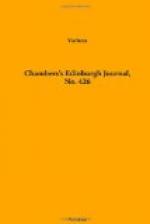W.C.
INFANT SCHOOLS IN HUNGARY.
The Austrian government has for some years been exerting itself, in connection with the clergy, for the improvement and spread of education in all the provinces of the empire, being anxious to do all in their power to save the country from those excesses which are so often found in connection with ignorance. As an Englishman, living in friendly intercourse with members of the imperial family, and many persons high in the administration, I am happy to avow my thorough conviction, that such, pure and simple, is the object held in view in the establishment of schools throughout the empire, and above all, in that of the infant schools, which are now planted in every place where there exists a sufficiency of population. I have all along taken a deep interest in these little seminaries in the kingdoms of Bohemia and Hungary, and am highly sensible of the liberal and humane principles on which they are conducted.
Each contains from two to three hundred children, between one and a half and five years of age, all of them being the offspring of the humbler classes, and many of them orphans. All are instructed in the same room, but classed apart; that is, the girls occupy one half of the apartment, and the boys the other, leaving an avenue between them, which is occupied by the instructors. The boys are under the superintendence of a master, and the girls under that of a mistress. Both, however, teach or attend to the various necessities of either, as circumstances may require. Infants too young to learn, and those who are sent, either because they are orphans, or because the extreme poverty of the mother obliges her to do outwork, are amused with toys and pictures, all, however, of an instructive nature, and which the elder children delight to exhibit and explain to them in their own quaint little ways. I have frequently seen an infant, scarcely able to walk, brought in for the first time, and left on one of the benches of the school-room, surrounded by those already initiated. The alarm its new position occasioned to the little creature, at thus suddenly finding itself abandoned by the only person with whom it was familiar, in the midst of a multitude of unknown faces, can easily be imagined. A flood of tears was the first vent to its feelings, accompanied by a petulant endeavour to follow its parent or nurse. It was immediately, however, surrounded by a score of little comforters, who, full of the remembrance of past days, when their fears and their sadness were in like manner soothed and dissipated, would use a thousand little arts of consolation—one presenting a toy or picture, another repeating what has almost become a formula of kindly re-assurance, till smiles and sunshine would succeed to tears and clouds upon that little brow, and confidence and content to fear and mistrust. I have often seen the day thus pass with neophytes as a dream, only to be broken when the parent or nurse, returning to take them home, found them in the centre of a little joyous group, the gayest of the gay!




